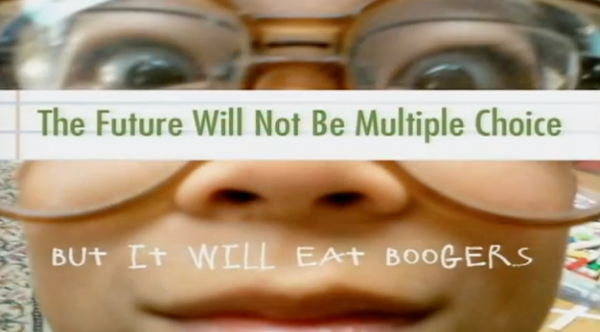
The Future will not be multiple choice
A while back I posed 13 Subversive Questions for the Classroom. Here’s the first five:
- If a question has a correct answer, is it worth asking?
- If something is “Googleable” why would we spend precious class time teaching it?
- When we ask students to summarize, do we actually want to know what’s important to them?
- What do you suppose students think they are supposed to be doing when we ask them to analyze?
- Do you ever ask your students questions you don’t know the answer to? Why not?
Here’s a TEDxCreativeCoast video – The Future Will Not Be Multiple Choice – that answers those questions and showcases the power of a PBL / design-based approach to learning. Turn curricula into design challenges, classrooms into workshops and teach students to think like designers.
While you watch it, try to think of a meaningful career that looks like filling out a worksheet.


Because it is safer, taught in teaching courses, and requires no thinking or creativity. Teachers need to ask questions that spark thinking, innovation, twist, and challenge. The problem is that this cannot be quantified for teacher evaluation so it is forbidden and attacked by education leaders and politicians who want ant like conformity.
Hi James,
Your observations, while cynical, are far too accurate.
Here’s to better days ~ Peter
Because it is not about what the teacher knows, it is about what the students know. It is also not about knowing or not knowing the answer, or what is the correct answer, it is how you respond to and develop the answer. The teacher is perfectly right in asking a question he or she knows the answer to. The teacher’s strength will be how he or she responds to the variety of answers that come out. Lastly, it is possible that by “knowing the answer,” the teacher exhibits having been down that path and knows what to expect. Overall, this is rather a silly question.
Mark,
I’ve always been inspired by Donald Finkel’s observation that teaching should “provoke reflection.” Glad to have been a catalyst for your thoughtful response to this post.
Cheers,
Peter
While I love the ideas that were brought up within this TED talk (and may steal a few), I am still not sure if computer use is truly necessary (especially pre-middle school or as necessary for students with learning issues). Designing, drawing, writing, these can still be done by hand to save precious resources (i.e. school budget) for other uses. More importantly, these skills develop a plethora of capacities within the student. It’s the difference among seeing a map online, coloring a pre-drawn/black line map, and being given a blank sheet of paper and a globe.
Just a thought…
Hi Kyna,
We teachers don’t “steal” we just are always on the lookout for good material to incorporate into our classrooms.
I like your comparison of map skills … a good way to look at those skills. I often think of the difference between an atlas map and a Google map. With the Google map there are tools you can use to personalize the information.
Cheers,
Peter